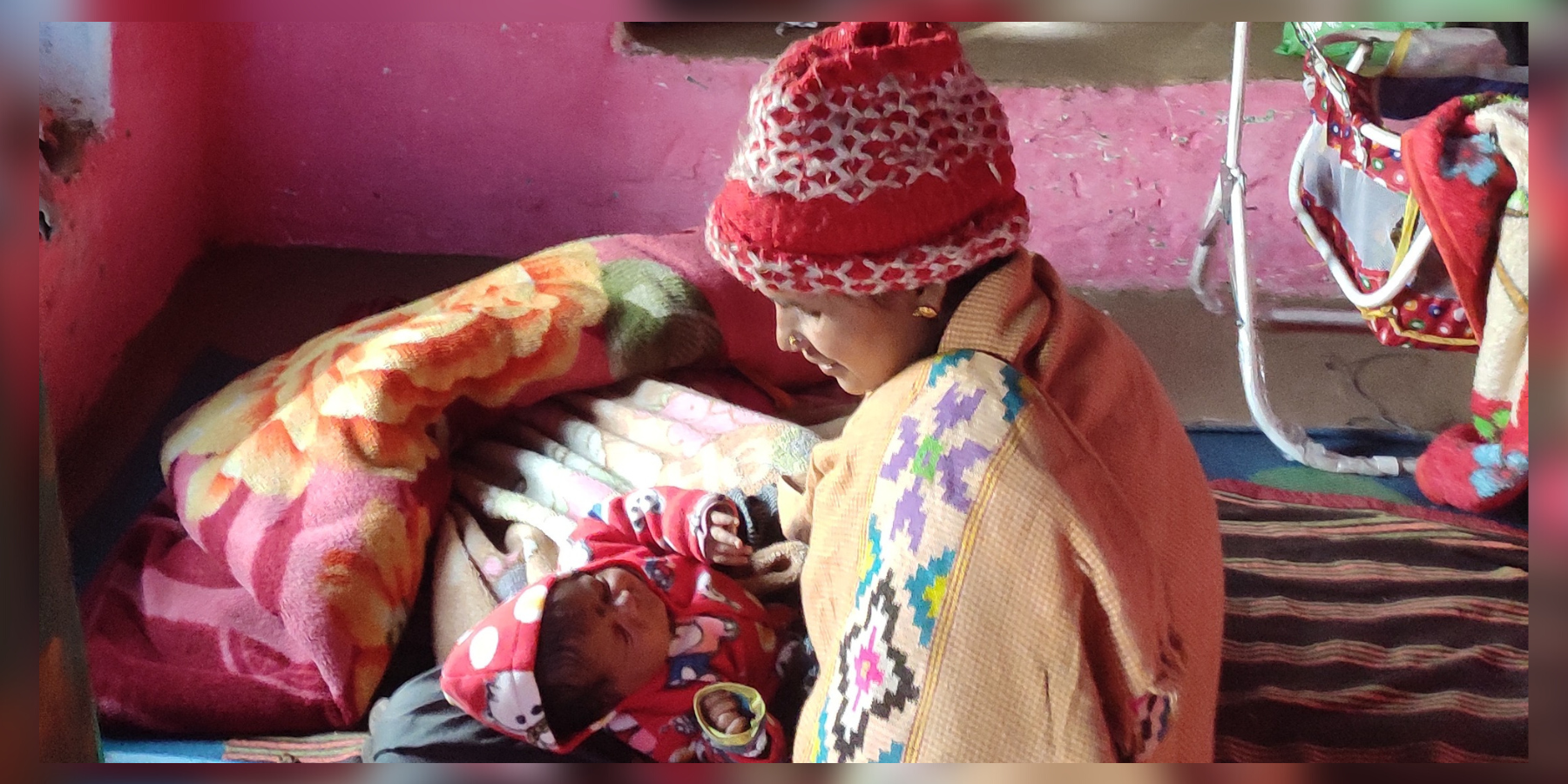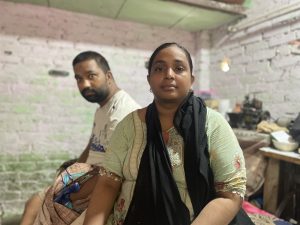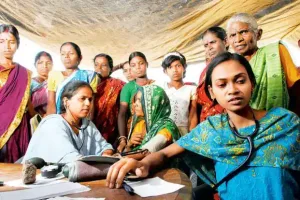‘Untouchable’ After Birth, Uttarakhand’s New Mothers Are Left In Stressful Isolation
At a time when women urgently need rest, support and monitoring, ritual segregation can be dangerous
- Swati Swati

Suman Devi checks on her 24 day-old baby, making sure he is fast asleep, and then grabs a bucket to draw water from the naula (aquifer) in her village, Salla, around 6 km from Almora town. It has been 24 days since she last performed this chore.
Twenty-three-year-old Suman’s break from housework had nothing to do with postpartum rest. She was in isolation because a woman is considered “ashudh (impure)” for 22 days after childbirth.
A host of traditional “purity” rituals practised in Uttarakhand, and elsewhere in India, require the segregation of new mothers at a time when they are vulnerable to postpartum complications and in urgent need of support, rest and monitoring. This isolation can have a long-term impact on their physical and mental well-being, say health experts.
As part of our investigation into traditional postpartum practices, we interviewed dozens of women, midwives and frontline health workers across eight villages of Almora and Pithoragarh districts in Uttarakhand.
Traditionalists argue that this seclusion allows a new mother time to rest, but it can be a lonely, stressful and depressing experience, the women said. “The first few days are difficult because the child cries at night, sleeps at odd hours, or refuses to suckle. As a new mother, you are afraid to even hold such a small baby,” says Deepika Khadka, of Doli village in Pithoragarh district. When her child slept she would use the time to wash her and her daughter’s “impure” clothes, she recalls, leaving her exhausted and anxious all the time.
“That the woman is impure after childbirth is an orthodox opinion and I don’t know its logic. But science tells us that it is important to ensure hygiene around a woman at this time because the lack of it can lead to horrible sepsis infections that may affect the whole body or more than two systems of the body. It is a common cause of post-delivery deaths in India,” says Tanvi Katoch, senior resident at the obstetrics-gynaecology department of the Post Graduate Institute of Medical Education & Research (PGIMER), Chandigarh.
Ritual Pollution Beliefs
This notion of postnatal “impurity” – like the idea of menstrual and funereal impurity – is common to many communities across India and it is practised in different forms. Even while institutional deliveries are increasing in India with 89% women delivering in hospitals, home deliveries still put the onus of this “containment” of “impurity” on the mother.
Some communities in West Bengal follow these practices of ritual pollution after birth. Our interviews with health activists from around the country showed the same – in Rajasthan, for instance, the bedding and clothes of women and infants are discarded 40 days after birth or stored away till the next childbirth in the family. In Kashmir, new mothers do not offer namaz and the placenta and postpartum bleeding are both treated as “impure”. A paper by childbirth activist and educator Janet Chawala reports that dais (midwives) in Bihar speak of the postpartum phase as ‘narak ka samay (time of hell)’.
These ritual practices are not practised with equal rigidity everywhere in the state. Their observance is also determined by education, class, location, family size (extended/nuclear) and so on. In a village with good access to health services, such as Gadoli in Almora , women are likely to opt for institutional delivery which does not leave any room for these practices, ASHA worker Babita Bisht told us. In more remote villages and homes where the elderly women dictate terms of social behaviour, segregation is likely to be more rigorous.
“It takes two hours for an ambulance to reach our village because it is remote and has no tarred roads. Three recent deliveries happened in the ambulance itself,” says Hema Bisht, an ASHA worker from Benali village in Almora.
‘Cho’, Or Untouchable
There is a close link between menstrual taboos and postpartum rituals and both relate to the expulsion of material from the body – blood and the placenta – says Sucharita Sarkar, associate professor at DTSS College of Commerce, Mumbai, and one of the lead researchers on the project Beyond Mother Goddesses: New Directions for International Scholarship on Motherhood in Religious Studies.
“For a woman in traditional Indian society the childbearing years are the most risky, as they are restricted and governed by a number of taboos relating to their behaviour, movement, decision-making, and status within the family, type of clothes they wear and food they consume, as they are seen as having the power to pollute men. Female sexuality is associated with pollution because of their biology and other circumstances. When associated with pollution, women are perceived as being in danger as well as endangering others,” says this 2009 study ‘Impact of ritual pollution on lactation and breastfeeding practices in rural West Bengal’.
In Uttarakhand, the postpartum period is referred to as cho, which translates to “untouchable”. Cho is seen as an external entity, not a natural biological process, and it is discussed as if it were an infection that clings to the body for days post birth. The length of isolation imposed during cho varies depending on the baby’s gender in parts of Almora – 15 days for a girl 22 days for a boy.
Some of these practices begin as early as the fifth or sixth month of pregnancy. In ultra conservative homes, people refuse to eat food cooked by a pregnant woman because she is “impure” and this is the case till 22 days after childbirth. She and the infant are also fed in separate utensils.
So entrenched are these notions of impurity around birth fluids and the placenta that women who practise midwifery in the villages we visited were mostly – but not always – from the Dalit community. Interviews with mothers and dais revealed an array of ritual practices pegged to birth. With 11% of births taking place in homes, these are fairly widespread in rural areas. The first of these relate to the disposal of the placenta.
“A Rs 5 coin is placed on a mound of dirt and the umbilical cord is then placed on top of it for the mother to cut,” says Parvati Devi, a dai (midwife) from Matena village in Almora. “The infant is cleaned by the dai but the mother has to clean herself,” says Radha Devi, a mother of three, who lives in Kausildhar village in the same district and works as a domestic help in a local home.
Sarkar points to a verse in the Atharva Veda describes the placenta as a dirty tissue that needs to be expelled and destroyed: “Not as it were stuck in the flesh, not in the fat, not as it were in the marrow, let the spotted slimy afterbirth come down, for the dog to eat.” In Uttarakhand villages, it is then up to the mother to discard the placenta after a home birth.
After birth, a dai cleans the newborn but the mother is left to clean herself and then go out and dispose of the placenta, women told us. If the mother is too weak to walk or it is too late at night, the placenta is saved for her to discard later. Women said they often had to dig a hole outside the village to bury the placenta and had no help to do this. Thereafter, the infant and mother are isolated in a separate room; if there is no spare room she is assigned to a corner from where she cannot move for 11 days.
A “boundary” is drawn with cow dung and she may cross it only to relieve herself or wash her own or the baby’s clothes. After the naming ceremony (naam karan) for the baby, the child regains “purity” but the mother continues to be isolated.
Dangers of Postnatal Isolation
The maternal mortality ratio in India is 96 per 100,000 live births, according to the latest data from government’s Health Management Information System (HMIS), contributing to 12% of global deaths caused by pregnancy-related factors. The biggest reason is obstetric haemorrhage (47%), followed by infections (12%) and hypertensive disorders (7%).
Postnatal monitoring of women’s health is critical but tends to be neglected during this enforced segregation and this can be dangerous. “Because a woman’s immunity is low after childbirth, she is extremely vulnerable to infections,” says Katoch of PGIMER.
Inderjeet Kaur, director of the midwifery unit at the Hyderabad-based Fernandez Hospital reiterates the dangers of isolating women in the days and weeks following birth. “Many women die due to postpartum haemorrhage, India’s biggest killer, because nobody knew they were bleeding to death – they were deemed unclean and left alone,” she says.
This isolation can also be damaging for the mother’s mental health. “COVID showed us what isolation does to the human mind. Many women suffer from postpartum blues which sets in immediately after childbirth. Isolation can push a woman into a depressive state, leaving her alone, not caring for her, and even not allowing her to care for herself,” says Katoch.
Entrenched beliefs
Cow urine is used as a “purifier” in villages. “It is sprinkled everywhere that I step. If I walk to the washroom someone walks behind me sprinkling it to purify the route. This is also done in the washroom after I use it,” says Deepika Khadka of Doli village.
Most women in Uttarakhand villages engage in some kind of farm work, and they routinely handle cow dung and urine. Cow dung is considered sacred in Kumaon and in parts of the state, infants are bathed in cow dung to get rid of lanugo, the downy hair they are born with.
But there is low awareness of the fact that its use inside closed living quarters can lead to infections at a time when both the new mother and infant are vulnerable. “What if a drop gets into the child’s eye?” asks Guddi Devi, former gram pradhan of Macchor village in Almora.
The bedding provided to the mother consists of layers of washable blankets and rugs, much thinner and less comfortable than a standard mattress and quilt. “After the 11th day naming ceremony, we have to wash it ourselves,” says Kavita of Kausildhar village.
Katoch says these practices could increase a woman’s sense of discomfort and anxiety. “The recommendation is for a regular bed that she has used her entire life, a bed on which she is comfortable to sit. A warm space is advised for both the mother and the child,” she says.
Family members may occasionally take the baby to massage her or hold her up to sunlight and warmth but then have to “purify” themselves with cow urine.
“We believe that the gods can become impure as a result of cho. And it physically affects a lot of people. If I get cho, I’ll feel it in my body – pain in my legs, ulcers on my tongue, or blisters on my head and face,” insists Parul*, a mother of four and grandmother of two, who lives in Someshwar.
Local midwives or dais believe that the ring of isolation is important for women. “The child has spent nine months in the mother’s womb, of course, it is impure,” says Shanti devi, a dai from Salla village in Almora. Upper-caste Thakur homes are often “purified” after a dai attends to a delivery, points out Nandi Devi, a dai from the Thakur community in Baghar village.
Dais also believe that they themselves become polluted by assisting in childbirth. “I’m not repulsed by the sight of it or the fluids on my skin, but I need to take a bath immediately after the delivery. I’ve had to take baths as early as 2 am on occasion,” says Parvati Devi. Some midwives also isolate themselves for five days.
Frontline health workers – tasked with monitoring the health, diet and well-being of new mothers and infants – who we interviewed in Uttarakhand said that these beliefs are too deeply rooted to be questioned.
“The practice of cho is not going anywhere anytime soon,” says Hema Bisht of Benali village.
Because of the taboo around the subject of sex and reproduction, women often enter motherhood with no basic understanding of what it implies. “I never had any kind of discussion around pregnancy. Once when I was visiting the doctor a woman told me how sometimes due to the labour there might be tears down there and that was the first time I heard about it,” said Deepika.
Even in hospitals not much information is given out to women, making early motherhood an isolating experience. There is thus very little questioning of the rituals. “We have to endure these rituals because we live here. If we ever get to migrate to a bigger city we will not follow them,” says Suman, from Salla village in Almora, cradling her newborn.
In Haldwani city, Bhawana Bisht, a mother of two, says she does not undertake postpartum impurity practices. “These practices are still prevalent even in cities among some families but we did not practise it. It mostly happens in joint families, where there are other women to take care of the new mother but if it’s a nuclear family like mine it becomes impossible to do.”
We believe everyone deserves equal access to accurate news. Support from our readers enables us to keep our journalism open and free for everyone, all over the world.




